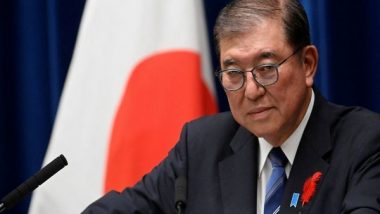Tokyo [Japan], November 11 (ANI): Leader of Japan's ruling Liberal Democratic Party (LDP), Shigeru Ishiba, has secured a new term as the country's prime minister after a parliamentary vote on Monday, local media reported.
Ishiba, 67, was first sworn in as prime minister in September after his predecessor, Fumio Kishida, stepped down amid a series of scandals.
The LDP leader won in a runoff vote for prime minister against opposition leader Yoshihiko Noda in the Lower House of the Japanese Diet to become the country's 103rd Prime Minister.
Ahead of the special parliamentary session on Monday, Ishiba and his cabinet resigned to make way for the prime ministerial vote.
In the initial round of voting in the 465-member House of Representatives, none of the candidates reached the majority threshold of 233 votes required to be elected prime minister. Later, after Ishiba received 221 votes and Noda over 160, the LDP chief was declared the winner, with 84 votes deemed invalid, Kyodo reported.
Former senior vice foreign minister Keisuke Suzuki will be named the country's new justice minister, and Taku Eto will again serve as farm minister. Hiromasa Nakano, a Komeito lawmaker, will assume the post of land minister in place of Tetsuo Saito, who became the party's chief, the Japanese news outlet reported.
In the runoff voting in the House of Representatives, 67-year-old Ishiba received 221 votes, outperforming Noda to become the country's 103rd Prime Minister despite falling short of the 233 majority threshold. Ishiba will later be formally inaugurated at a ceremony at the Imperial Palace and hold a press conference in the evening.
The prospect of a minority government means the ruling coalition needs to heed more to demands from the opposition bloc that has gained strength since the Oct. 27 general election.
In a stark reminder of its weakening grip on parliament, an opposition member will chair the powerful budget committee of the lower house for the first time in three decades. Diet deliberations may require more time and concessions from the ruling bloc, reported Kyodo News.
The CDPJ has an increased presence in the lower chamber, and the same goes for the opposition Democratic Party for the People, which has been courted by both sides of the aisle, with its seats quadrupling from before the election.
The opposition camp is expected to ramp up pressure on Ishiba to push for drastic political reforms, as the LDP's defeat in the election was partly attributed to its failure to restore voter trust following the ruling party's inappropriate handling of political funds, reported Kyodo News.
The CDPJ and the DPP are calling for a legal revision to make the flow of political funds more transparent and for the establishment of a third-party panel to impose checks.
The government is planning to compile a package of economic measures intended to mitigate the negative fallout of rising prices by providing cash handouts to low-income earners and lowering energy prices through subsidies.
A supplementary budget for the current fiscal year to next March will be needed to finance the package.
Ishiba is inclined to ensure stability and continuity as the country faces myriad challenges, ranging from inflation to security threats from China, North Korea and Russia, reported Kyodo News.
He is expected to make only minor changes to his Cabinet lineup this time, mostly replacing those who lost their seats in the election. (ANI)
(This is an unedited and auto-generated story from Syndicated News feed, LatestLY Staff may not have modified or edited the content body)













 Quickly
Quickly
















